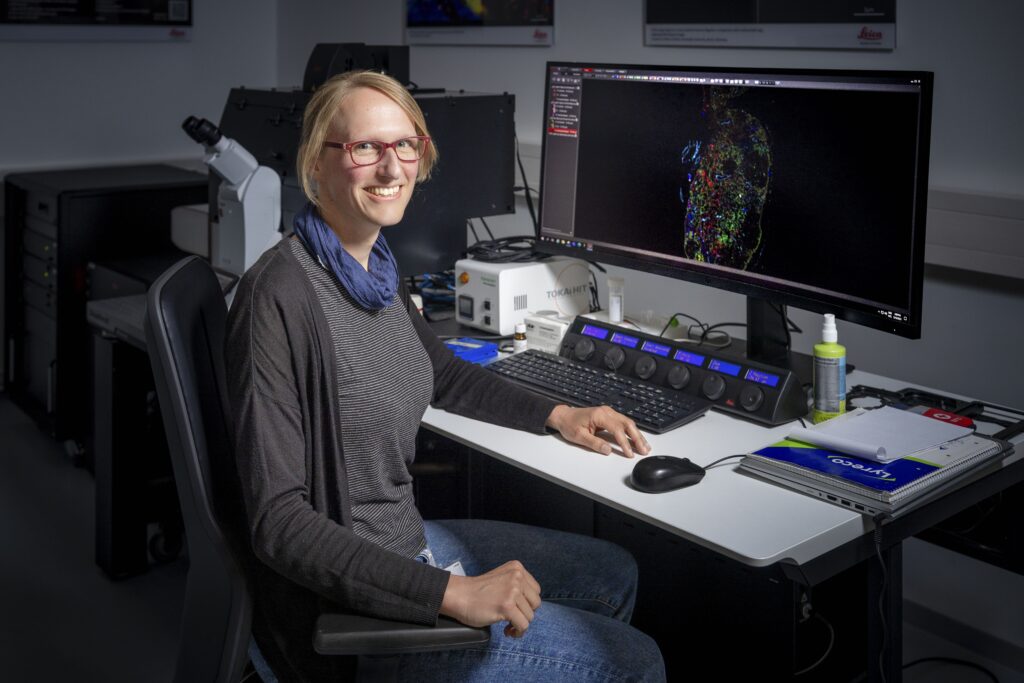Unlocking cancer research: How CanSERV funds opened doors for cutting-edge imaging at the EMBL Imaging Centre

Cancer research is a crucial field, demanding the best tools and resources to unravel its complexities. That is why we are thrilled to share the story of Dr. Sarah Hofmann, the first researcher to access the EMBL Imaging Centre (EMBL IC) through the CanSERV project (GA-101058620) – and how this funding opportunity is impacting her work.
CanSERV: Making a difference in cancer research
CanSERV is an EU-funded initiative under the Horizon Europe programme where European Research Infrastructures provide access to biological and biomedical imaging technologies, structural biology methods, genomics and analytical pipelines, biobank and mouse samples and many other services for addressing fundamental cancer research questions at a molecular, cellular and whole organism level. The project is designed to accelerate cancer research across Europe and beyond. It offers a comprehensive portfolio of cutting-edge, interdisciplinary oncology services to scientists from around the world. The aim is simple: to provide researchers with the resources they need to make breakthroughs in cancer prevention, diagnosis, and treatment.
Through Euro-BioImaging’s participation in CanSERV, access to a comprehensive range of imaging technologies and expertise across 38 Euro-BioImaging Nodes, including the EMBL Node, is open and freely available to successful applicants.
Sarah’s story: Exploring immune responses in lymph nodes
Dr. Sarah Hofmann, a postdoctoral researcher in Prof. Dr. Lothar Dieterich’s lab at the University Hospital Mannheim, is studying the lymphatic system, with a specific focus on lymph nodes. Her work delves into how the immune response is regulated within the lymph node, particularly in the context of tumour draining environments and the differences between that and healthy tissue.
A crucial part of Sarah’s research involves multiplex imaging of lymph nodes. This powerful technique allows her to visualise more than five different markers simultaneously in a single sample, providing a richer and more detailed understanding of the complex cellular interactions at play. However, the University Hospital Mannheim lacks the equipment necessary to perform such advanced multiplex imaging.
A perfect match: EMBL Imaging Centre and the CanSERV Call
Sarah’s prior experience as an Applications Specialist at Leica, where she focused on multiplexing techniques, made her aware of the power of this imaging technology. To be able to perform such an experiment, microscopes need to be capable of simultaneous imaging and quantification of multiple biomarkers in the same sample, a significant advancement for her research. Recognising the potential, she sought out a facility with a suitable microscope. Through her professional network, she discovered the EMBL IC where a LEICA STELLARIS capable of performing 15-colour multiplex imaging was available.After an initial consultation with our team, it became clear that Sarah’s project was an excellent fit for the CanSERV open call. This funding opportunity would allow her to access our state-of-the-art facility and expertise free of charge. She applied for the CanSERV funding and was thrilled to be awarded the grant. The Euro-BioImaging team also provided invaluable support to Sarah throughout the application and review process.

Sarah Hofmann operating the Leica STELLARIS STED. Credits: Stuart Ingham/EMBL Photolab
Teamwork and cutting-edge technology
Since receiving the CanSERV funding, Sarah has been regularly performing imaging at the EMBL IC. She is already capturing impressive images and is extremely pleased with the results. As the first CanSERV user at our facility, her success highlights the importance of these funding opportunities.
Sarah emphasised that the EMBL IC team granted her access to all STELLARIS systems, aided in instrument booking, offered troubleshooting assistance, and even connected her with Leica experts. As we are also committed to providing comprehensive technical support, we worked closely with Sarah and her existing expertise. We even granted her access to the microscopes for pilot experiments before the official grant approval.
A transformative opportunity
Sarah highlights that access to the EMBL IC has been instrumental in her research, stating that she would not be able to progress without the microscope available here. Her experiments hinge on a multiplex capable system, making the EMBL IC a vital resource.
Sarah feels incredibly fortunate to have discovered the CanSERV call, which was a perfect match for her project and encourages other researchers seeking funding to proactively educate themselves and explore opportunities on the Euro-BioImaging webpage.
In Sarah’s own words:
“I am very grateful to have access to the EMBL Imaging Centre. This is the only opportunity for me to do experiments using the STELLARIS microscopes. I can highly recommend everybody to apply for funding, and take advantage of the excellent systems available here.“
The future of cancer research
Sarah’s story is a testament to the power of collaborative research and the importance of funding initiatives like CanSERV. By providing access to cutting-edge technologies and expert support, we can empower researchers to make significant strides in the fight against cancer. We at the EMBL IC are proud to be a part of this effort and look forward to supporting many more researchers.
Do not miss out! The final call for CanSERV funding is now open – apply by 15 July 2025, 2:00 PM CEST!